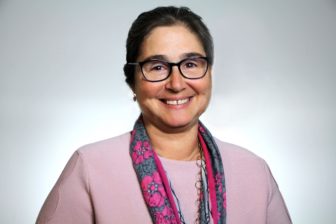Goldblum is CEO of the New Haven-based National Diaper Bank Network (NDBN), an organization dedicated to getting basic needs to people. She co-authored the Basic Needs-Informed Care Curriculum—with support from Yale School of Medicine faculty—designed to help clinicians, social workers and educators recognize the myriad ways a lack of resources can present itself.
For example, a baby comes to a well child visit in dirty clothes. Clinicians might typically ask: Is the mother too depressed to care for the infant?
Goldblum wants the visit to begin with more basic questions: Does Mom have detergent or the money to go to a laundromat? Money and hygiene can both be taboo subjects, she said, and this prevents frank discussions.
“While doctors and teachers and other providers are taught to ask lots of questions and to do assessments of various things in people’s lives, they aren’t taught to talk about basic needs,” Goldblum said. Her curriculum points out how a lack of resources can be misconstrued as a physical or mental illness. Goldblum encourages professionals to ask about access to things like soap, shampoo, transportation and food.
The curriculum takes participants through the nuts and bolts of poverty, showing how little cash people have when they rely on either minimum wage jobs or public assistance. It talks about the cost of things that cannot be purchased through SNAP (food stamps), including diapers, tampons and housecleaning products—all necessities, and none of them cheap. Presenters also discuss the stigma attached to poverty and help participants explore their own biases.
Megan V. Smith, an associate professor in the Department of Psychiatry and in the Child Study Center in the Yale School of Medicine and director of the Mental Health Outreach for MotherS (MOMS) Partnership, served as one of the curriculum authors. Smith’s research often looks at how meeting basic needs affects mental health. She and Goldblum began discussing the project after the American Academy of Pediatrics (AAP) released a policy statement on poverty in 2016. The academy listed the many and severe health consequences of child poverty – which in Connecticut is 12.6 percent of children under age 18 – and issued a call for members to address it in their practices. But the AAP did not offer specifics on how to do that.
“As a clinical psychologist, I frequently encounter people who seem depressed,” said Jacqueline Guajardo, who teaches at the University of Connecticut/St. Francis Hospital Family Medicine Residency Program based at the Family Medicine Center at Asylum Hill, where she is director of behavioral health.
“But sometimes you don’t need medication; you don’t need therapy; you need food.” She makes sure the young doctors she supervises learn how to recognize poverty’s role in health by including the curriculum in their work.
Guajardo said screening for poverty should be part of every visit, because even patients who are well-dressed may have empty refrigerators. “You don’t know if you don’t ask,” she said.

Joanne Goldblum
Starting a discussion about money can be difficult. “The easiest thing is not to ask,” said Teresa Twomey, director of global nursing experiences at the Quinnipiac University School of Nursing. Twomey said discussions about poverty are woven throughout students’ work. Once providers do ask about poverty, they need to know what to do with the information, she said. So nurses must learn what resources exist in their communities to provide people with basic needs.
The Basic Needs curriculum teaches professionals to find out about local resources—and to advocate for more. “What you can do as a helping professional is use your voice,” Goldblum said. Advocating for better funding for the social safety net, perpetually in danger of being cut, is an excellent way to help, she said.
Incorporating the social sciences into education for health professionals is fairly new, said Katherine McLeod, assistant professor of medical sciences at Quinnipiac University School of Medicine. “But it’s growing,” she said. Helping students overcome their unconscious biases about poverty and learning about topics like food insecurity are becoming integral to medical education, McLeod said.
Goldblum said that it’s time for helping professions to speak frankly about topics like hygiene and poverty. “I think it’s like sex, like mental health—it’s something that we don’t talk about, and the more that we normalize the conversation and open up the conversations, the better it will be,” she said.
Colleen Shaddox is a freelance writer for the Connecticut Health Investigative Team and works with the National Diaper Bank Network.

